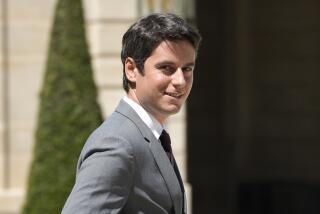EUROPE : Chirac’s 1st Year Plays Well on World Stage, Falls Flat at Home
- Share via
PARIS — The puppet representing President Jacques Chirac these days on “Les Guignols,” the hugely popular satirical TV show, bears a striking resemblance to an energetic retiree on a cruise ship. Sporting a deep tan, he has the casual manner of a fellow with plenty of time on his hands.
Truth be told, Chirac doesn’t have much of a tan. But he sure does like to travel. One year into his seven-year term, the French president has logged 15 official journeys in France and 28 around the globe, from the Spanish isle of Majorca to Bangkok, Thailand, and from Washington to Moscow.
In the process, the conservative president has boosted France’s flagging image abroad, combining his warm personality with straight talk to win respect and erase some of the suspicion engendered by his inscrutable predecessor, the late Francois Mitterrand.
As a result, Chirac is emerging as the most dynamic, if also the most unpredictable, leader in Europe.
French politicians, analysts and newspaper columnists have spent weeks now writing report cards on the president’s first year, and the grades are predictably mixed. While supporters praise the president’s diplomatic successes, opponents criticize him for unfulfilled campaign promises and domestic malaise.
French voters also have mixed feelings about the former Paris mayor. A poll published in the magazine Paris-Match found that three-fourths of the French rate him “dynamic” and “cultivated,” but only a third were satisfied with his performance.
In fact, after years of Mitterrand’s aloofness, Chirac’s common touch and zest for life come as a refreshing change.
Touring the country, he kisses babies, devours huge quantities of food and listens intently, always leaving smiles in his wake.
The French have welcomed Chirac’s attempts to make France more respected abroad. Many here share his belief that it is important to improve relations with the United States but also to occasionally steal the diplomatic initiative from Washington.
Le Figaro, the conservative Paris daily, praised Chirac recently for helping France retake its role as “l’embeteuse du monde,” the world’s nuisance. It credited Chirac with forcing the United States to press for peace in Bosnia-Herzegovina, protecting the interests of Lebanon and Syria in the recent cease-fire brokered with Israel, and leading the drive toward greater European unity.
On the domestic front, though, Chirac has fared poorly. His decision to resume nuclear tests made him deeply unpopular. But even more devastating was Chirac’s about-face on unemployment.
He came to office with a read-my-lips declaration. “Our main objective has one name only--the fight against unemployment,” he said on election night. “With each new reform, we will ask one question only: Will it be good for employment?”
It was a statement he would come to regret. Just six months later, Chirac decided that France’s 3.3 million jobless, about 12% of the work force, would have to wait a few years.
The more important objective, he said, was to cut the government deficit and qualify for European monetary union. And the way to do that was to cut public worker benefits.
The result was a paralyzing transport strike that stretched from late November until December, when the government made key concessions. Chirac tried to stay above the fray, allowing Prime Minister Alain Juppe to take the heat.
Nevertheless, Chirac’s ratings plummeted, reaching a level lower than any new president here since World War II.
Now that peace has returned to the streets, Chirac’s poll ratings have edged upward again.
His task in the coming months will be to persuade the French that sacrifices will be necessary. He began the sales job last week, on the anniversary of his election, in the Paris daily Le Monde.
“France must move from a culture of assistance to a culture of responsibility,” Chirac wrote. “In a country such as ours, where recourse to the state is second nature, we must have a revolution in thinking.”
Analysts say that Chirac, backed by a strong majority in the National Assembly and six more years in office, should have both the tools and the time to try to effect such a change. The question is: Will the revolution be peaceful?
More to Read
Sign up for Essential California
The most important California stories and recommendations in your inbox every morning.
You may occasionally receive promotional content from the Los Angeles Times.














